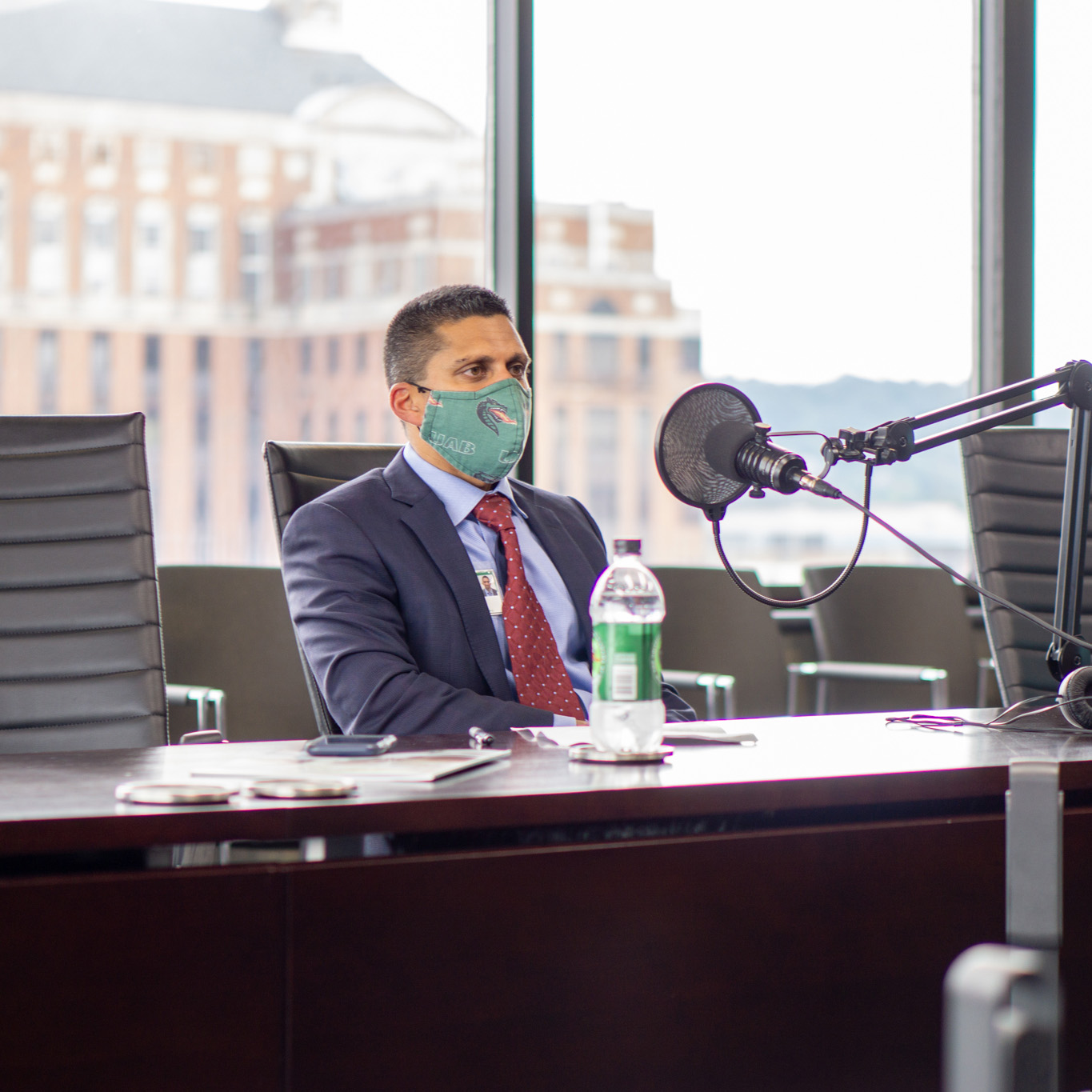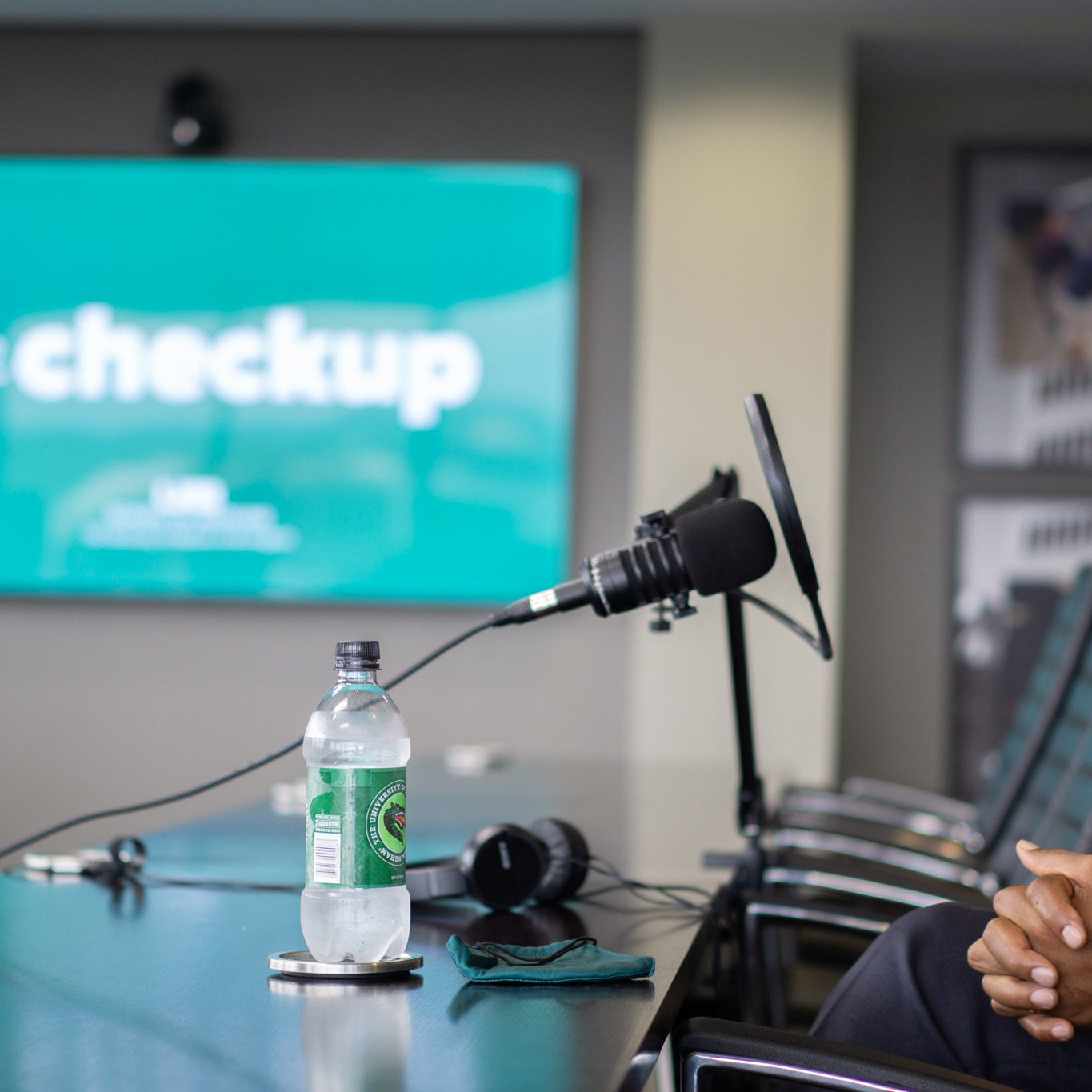 What is wellness? How does wellness impact health and day-to-day life? As a family and sports medicine physician, Irfan Asif, M.D., professor and chair in the Department of Family and Community Medicine and associate dean for Primary Care and Rural Health, works to answer these questions for his patients and the broader community every day.
What is wellness? How does wellness impact health and day-to-day life? As a family and sports medicine physician, Irfan Asif, M.D., professor and chair in the Department of Family and Community Medicine and associate dean for Primary Care and Rural Health, works to answer these questions for his patients and the broader community every day.
In his latest podcast episode, Selwyn Vickers, M.D., FACS, dean of the School of Medicine, sat down with Asif to discuss wellness during National Wellness Month. Both physicians approach wellness a little differently and discuss the importance of wellness for personal, professional, and community health.
Coming to a wellness mindset
To kick off this episode, Vickers asks Asif to share his journey to UAB and primary care.
Asif implemented a wellness and prevention model for his patients early on in his medical training. He shares a story about a man he cared for during a race as part of a volunteer medical team. The man died of sudden cardiac arrest, though he appeared to be completely healthy. After witnessing his death, Asif decided to pursue family medicine instead of his original intent to become an orthopedic surgeon.
Throughout his medical career, Asif has learned and implemented wellness practices at different institutions.
"As I was continuing my research on cardiac death and illness in athletes at the University of Tennessee, I made the switch to becoming vice-chair of academics and research at the University of South Carolina,” Asif recalls. “I began to think, can we use these same principles that we use with athletes to prevent heart disease in everyone?”
Asif and his team began working with the general population to implement wellness programs to encourage exercise, better sleep habits, and healthier diets. He has continued similar programs at UAB and involved researchers in his department in studying nutrition and behavioral health alongside these wellness programs to optimize patient outcomes.
Wellness as preventive medicine
Vickers asks Asif what comes to mind when he considers wellness needs for individuals related to disease prevention. Asif notes that while many physicians may lean toward medicines to help combat patients' disease, he looks at lifestyle measures that can be changed to decrease risk.
“Fundamentally, how do we get people to move? If they can’t exercise like you or I can, could they take more steps in a day?” says Asif.
Plus, routine screenings for illnesses like breast cancer, colon cancer, and others are crucial in primary care. Asif believes in using preventive methods to manage chronic conditions.
“If you look at Alabama, we have poor performance in almost every area of chronic disease,” says Vickers. “It's not only to do with lifestyle, or things like diet, but also with access to care.”
To increase wellness and eliminate disparities, Asif and Vickers agree that it's essential to change cultural attitudes toward health to create meaningful outcomes. “We have to get out into the communities and bring them to the table to see how we can bring wellness practices to their groups or settings,” says Asif.
The pair discuss creative ways to bring wellness into Alabama by modeling programs like Hip Hop Public Health in San Fransisco and Live HealthSmart Alabama are employing in different areas.
Perspectives on personal wellness
Vickers and Asif also discuss how they incorporate wellness into their own lives.
For Asif, wellness looks like an active lifestyle of sports and running. He also enjoys spending time hiking around Birmingham with his family. Vickers finds well-being in biking and spending time near water. He shares his love of deep-sea fishing and being with his family to recharge during stressful times.
Both men focus on the importance of connecting with loved ones and prioritizing wellness, especially during an isolating time like the COVID-19 pandemic.
“When I think of the different aspects of wellness, mental health is really the biggest piece that has been impacted for me during COVID,” says Asif. “I focus on wellness practices that build resilience like a practice called ‘Three Good Things’ where I write three good things that happened to me or that I was able to do for someone else at the end of each day.”
A department focused on wellness
Family medicine is a natural place to emphasize wellness practices, like exercise and a healthy lifestyle. His team in the Department of Family and Community Medicine works to maintain wellness because of a shared passion for personal growth.
Asif credits much of the department’s focus on wellness to faculty and staff who lead various wellness initiatives. The department focuses on identity, inclusion, leadership, interprofessional education, nutrition, mental health, and more.
As a practical way to model wellness, Asif opens departmental meetings with a minute of “centering.” He and others agree that centering helps keep discussions on track and allows everyone to take a mindfulness break during their busy days.
Extending wellness to Alabama
Additionally, Asif discusses a new initiative in his department, the Comprehensive Urban Underserved and Rural Experience (CU2RE) program, that focuses on eliminating health disparities and improving access to care.
CU2RE focuses on improving the quality and number of medical students who match into primary care or family medicine and are interested in serving underserved areas. Students, Asif notes, have found the program to be an extremely beneficial complement to their UAB medical education.
CU2RE teaches students about social determinants of health and the limits that some patients face when making healthy choices. Students are paired with a 10-patient panel to care for and work with throughout their four years of medical school. All patients that CU2RE students interact with come from underserved backgrounds.
"These ten patients are going to teach the students about themselves, about patients, about communities, and the healthcare system," says Asif.
Signing off and giving back
Towards the end of the episode, Vickers and Asif discuss the importance of giving back to promote mental health and wellness in both the giver and receiver.
“We’ve talked a lot about personal wellness and the wellness of teams, but how do we give back to the communities we serve?” poses Asif. “To me, giving back to the community, seeing a smile on someone else’s face when they are going through a difficult time, I think that can lift us up during COVID or any time of need for all of us across the world.”
 Listen to 'The Checkup'
Listen to 'The Checkup'
In 'The Checkup' podcast, Vickers explores topics related to UAB and the city of Birmingham, such as unique campus programs, innovative concepts, and ground-breaking research.
Check out the latest episode on wellness, or explore topics on mentoring, Juneteenth, LGBTQ+, and more. Now playing on Spotify, Apple, or anywhere you listen to podcasts.